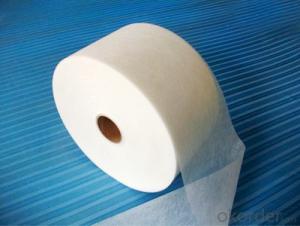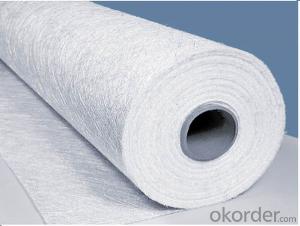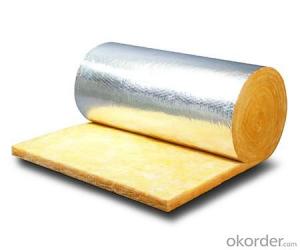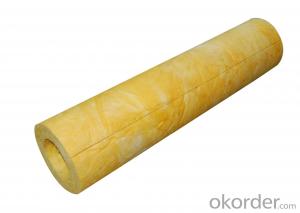Glass Fiber Surface Tissue For FRP Industry
OKorder Service Pledge
OKorder Financial Service
You Might Also Like
Descrition:
Fiberglass surface mat is mainly used for the surface layer of fiberglass products. Divided into specific wound type S-BM (w) series, hand lay-type S-BM (H) series and pultrusion type S-BM (P) series of three categories.
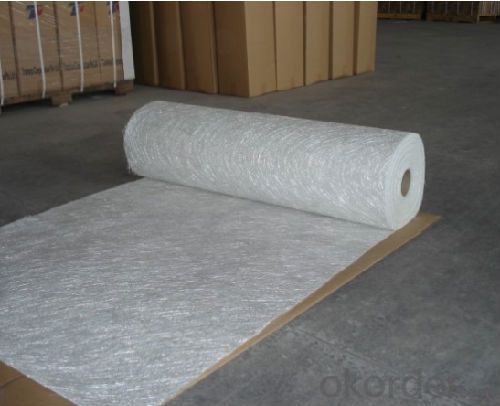
Main features:
1, fibers uniformly dispersed
2, resin-impregnated fast
3-volt mode is good
4, to cover wove, smooth surface layer
5, anti-aging, good corrosion resistance
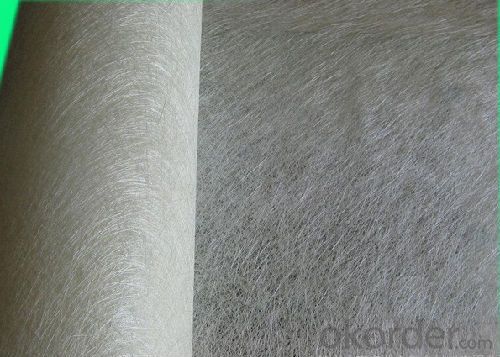
Specificaiton
| Product Code | Unit Weight(g/㎡) | Gum content(%) | Longitudinal tensile strength(N/5cm) | Moisture content(%) |
| S-BM(W)-30 | 30 | 7 | ≥30 | ≤0.5 |
| S-BM(W)-50 | 50 | 7 | ≥50 | ≤0.5 |
| S-BM(H)-30 | 30 | 6 | ≥25 | ≤0.5 |
| S-BM(H)-50 | 50 | 6 | ≥40 | ≤0.5 |
| S-BM(P)-90 | 90 | 8 | ≥200 | ≤0.5 |
Packaging:
The mat roll is wrapped up with plastic film,and then packed in a cardboard box or wrapped up with kraft paper. The rolls can be horizontally placed. For transportation, the rolls can be loaded into a cantainer directly or on pallets.
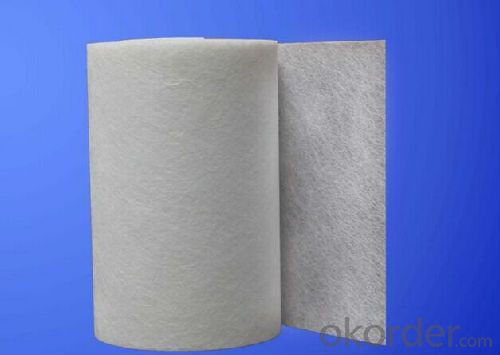
- Q:What is fiberglass mat tissue made of?
- Fine strands of glass fibers are used to create fiberglass mat tissue, which is a flexible material resembling fabric. The glass fibers are usually produced by melting glass and transforming it into thin filaments. These filaments are then coated with a binding agent to enhance their strength and durability. The woven composition of the fiberglass mat tissue contributes to its ability to reinforce and stabilize different materials and products. This makes it a suitable option for insulation, roofing, and composite materials.
- Q:How does fiberglass mat tissue compare to spray foam insulation?
- Fiberglass mat tissue and spray foam insulation are two different types of insulation with their own unique characteristics and benefits. Fiberglass mat tissue is a lightweight and flexible material made from spun glass fibers that are arranged into a mat. It is commonly used in the construction industry for thermal and acoustic insulation purposes. Fiberglass mat tissue is relatively easy to install and provides good thermal resistance, helping to regulate temperature and reduce energy loss. However, it may not be as effective in sealing air leaks or filling gaps compared to spray foam insulation. On the other hand, spray foam insulation is a liquid mixture that expands into a foam after being sprayed. It fills gaps and crevices, creating an airtight seal that helps to prevent air leakage and reduce energy consumption. Spray foam insulation can also provide a higher R-value (a measure of thermal resistance) compared to fiberglass mat tissue, making it more efficient in terms of insulation performance. However, the installation process for spray foam insulation can be more complex and may require professional assistance. In summary, fiberglass mat tissue is a cost-effective and easy-to-install insulation option that offers good thermal resistance but may be less effective in sealing air leaks. Spray foam insulation, on the other hand, provides superior insulation performance and air sealing capabilities, but may require professional installation and can be more expensive. Ultimately, the choice between the two will depend on factors such as budget, specific insulation needs, and the desired level of air sealing.
- Q:Can fiberglass mat tissue be used for making swimming pool shells?
- Yes, fiberglass mat tissue can be used for making swimming pool shells. Fiberglass mat tissue is a strong and durable material that is commonly used in construction and manufacturing industries for its excellent properties. It is made by bonding fine glass fibers together with a resin binder, resulting in a flexible and lightweight material. When used for making swimming pool shells, fiberglass mat tissue provides a number of advantages. Firstly, it is highly resistant to water, making it an ideal choice for swimming pool applications. It is also resistant to chemicals commonly found in pool water, such as chlorine, ensuring the longevity of the pool shell. Additionally, fiberglass mat tissue is easy to work with and can be molded into any desired shape or size. This allows for the creation of custom-designed swimming pool shells, catering to specific requirements and preferences. The material's flexibility also enables it to withstand ground movement and temperature changes, ensuring the structural integrity of the pool shell. Furthermore, fiberglass mat tissue has a smooth surface finish, making it aesthetically pleasing and comfortable to touch. It can be easily painted or coated with gel coats to enhance its appearance and protect it from UV rays, preventing discoloration and deterioration over time. In conclusion, fiberglass mat tissue is an excellent choice for making swimming pool shells due to its water and chemical resistance, flexibility, durability, and aesthetic appeal.
- Q:What are the typical roll sizes available for fiberglass mat tissue?
- The typical roll sizes available for fiberglass mat tissue range from 50 to 100 inches in width and can vary in length, depending on the manufacturer and specific product requirements.
- Q:Can fiberglass mat tissue be used for repairing fiberglass structures?
- Fiberglass structures can be repaired using fiberglass mat tissue. This material is widely used in the construction and repair of fiberglass structures because of its versatility. Its purpose is to strengthen and reinforce damaged areas of the structure. To ensure a durable repair, the mat tissue is usually applied with resin, which bonds the fibers together. It is particularly effective for fixing cracks, holes, and other damages on fiberglass surfaces. In summary, fiberglass mat tissue is an outstanding option for repairing fiberglass structures due to its strength, flexibility, and ability to adapt to different shapes and sizes.
- Q:How does the thickness of fiberglass mat tissue affect its flexibility?
- The thickness of fiberglass mat tissue directly affects its flexibility. Generally, thinner fiberglass mat tissue is more flexible compared to thicker ones. This is because the thickness of the mat tissue determines the amount of resin that can be absorbed and the overall weight of the material. Thinner mat tissue allows for more resin saturation, which increases its flexibility. Additionally, thinner mat tissue is lighter in weight, making it easier to bend and shape. On the other hand, thicker mat tissue is less flexible due to its lower resin absorption capacity and heavier weight. It may require more force or effort to bend or shape thicker mat tissue compared to thinner ones. Therefore, the thickness of fiberglass mat tissue plays a crucial role in determining its flexibility.
- Q:Does fiberglass mat tissue require any special precautions during transportation?
- Special precautions must be taken during the transportation of fiberglass mat tissue as it is a delicate material that can easily be damaged if not handled correctly. To ensure safe transportation, several measures should be implemented. To begin with, it is necessary to pack the fiberglass mat tissue in a strong and durable material that can protect it from external impacts and vibrations. Heavy-duty cardboard boxes or wooden crates should be used to provide sufficient cushioning and support. Furthermore, it is vital to clearly label the packaging as "Fragile" or "Handle with Care" to alert handlers about the delicate nature of the product. This will help prevent any mishandling or rough treatment during transportation. In addition, the fiberglass mat tissue should be stored and transported in an upright position to minimize the risk of bending or folding that could potentially damage the material. It is also important to avoid placing heavy objects on top of the fiberglass mat tissue to prevent unnecessary pressure or crushing. Lastly, it is advisable to utilize secure and reliable transportation services with experience in handling delicate materials like fiberglass mat tissue. This ensures that the product is transported with the utmost care and attention, reducing the likelihood of damage during transit. By adhering to these special precautions, the risk of damage to the fiberglass mat tissue during transportation can be significantly reduced, guaranteeing its arrival in perfect condition.
- Q:Does fiberglass mat tissue provide good moisture control?
- Yes, fiberglass mat tissue does provide good moisture control. It is a highly effective material that helps to prevent moisture build-up and condensation by providing a barrier against water intrusion. Additionally, it helps to improve the overall insulation of the structure, further enhancing moisture control.
- Q:Can fiberglass mat tissue be used in high-temperature applications?
- No, fiberglass mat tissue cannot be used in high-temperature applications.
- Q:Is fiberglass mat tissue suitable for automotive applications?
- Fiberglass mat tissue is indeed suitable for automotive applications. This versatile material offers numerous benefits when utilized in the automotive industry. It boasts excellent strength and durability, crucial qualities for automotive parts that must endure harsh conditions and heavy use. Moreover, fiberglass mat tissue possesses commendable thermal and electrical insulation properties, making it ideal for applications that require resistance to temperature and electrical currents. Furthermore, the lightweight nature of fiberglass mat tissue can contribute to enhanced fuel efficiency and overall vehicle performance. It is also highly malleable, enabling manufacturers to craft intricate automotive parts with precision. Additionally, this material resists corrosion, chemicals, and UV radiation, ensuring that automotive components remain reliable and long-lasting. In summary, the exceptional qualities of fiberglass mat tissue make it an optimal choice for various automotive applications, such as body panels, interior components, structural reinforcements, and sound insulation. Its strength, durability, insulation properties, lightweight nature, and resistance to corrosion and chemicals make it a dependable and cost-effective material for the automotive industry.
1. Manufacturer Overview |
|
|---|---|
| Location | |
| Year Established | |
| Annual Output Value | |
| Main Markets | |
| Company Certifications | |
2. Manufacturer Certificates |
|
|---|---|
| a) Certification Name | |
| Range | |
| Reference | |
| Validity Period | |
3. Manufacturer Capability |
|
|---|---|
| a)Trade Capacity | |
| Nearest Port | |
| Export Percentage | |
| No.of Employees in Trade Department | |
| Language Spoken: | |
| b)Factory Information | |
| Factory Size: | |
| No. of Production Lines | |
| Contract Manufacturing | |
| Product Price Range | |
Send your message to us
Glass Fiber Surface Tissue For FRP Industry
OKorder Service Pledge
OKorder Financial Service
Similar products
New products
Hot products
Hot Searches
Related keywords
